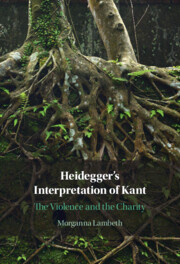Book contents
- Heidegger’s Interpretation of Kant
- Heidegger’s Interpretation of Kant
- Copyright page
- Dedication
- Contents
- Acknowledgments
- Abbreviations
- Introduction
- Chapter 1 The Two-Strand Method of Interpreting Kant
- Chapter 2 The Receptivity and Spontaneity of Cognition
- Chapter 3 A Common Root
- Chapter 4 The Metaphysical Deduction and Schematism
- Chapter 5 The Transcendental Deduction
- Chapter 6 The Form of Time and Self-Affection
- Conclusion
- Coda
- Bibliography
- Index
Chapter 2 - The Receptivity and Spontaneity of Cognition
Published online by Cambridge University Press: 01 June 2023
- Heidegger’s Interpretation of Kant
- Heidegger’s Interpretation of Kant
- Copyright page
- Dedication
- Contents
- Acknowledgments
- Abbreviations
- Introduction
- Chapter 1 The Two-Strand Method of Interpreting Kant
- Chapter 2 The Receptivity and Spontaneity of Cognition
- Chapter 3 A Common Root
- Chapter 4 The Metaphysical Deduction and Schematism
- Chapter 5 The Transcendental Deduction
- Chapter 6 The Form of Time and Self-Affection
- Conclusion
- Coda
- Bibliography
- Index
Summary
Along with the third chapter, this chapter shows that Heidegger’s interpretation of Kant is informed by the successes and failures of previous interpretations. Heidegger does not bring idiosyncratic concerns to Kant’s text, but rather carries forward an interpretive tradition that began with the German Idealists and continued with the Marburg Neo-Kantians: a tradition that attempted to unify Kant’s dual faculties of sensibility and understanding, and to therefore ground the metaphysical principles that depend on their unification. The Neo-Kantians unify the faculties by insisting that human cognition is understanding through and through; Kant was wrong to think we have a separate faculty of sensibility. This interpretation erases the signature discursivity of Kant’s position, the idea that two qualitatively different faculties are required for us to cognize. This chapter shows that Heidegger’s interpretation does not have this result, even though it prioritizes the faculty of imagination. Heidegger’s central thesis in his Kant book – that, on the best version of Kant’s argument, the imagination has priority as the source of cognition – rests crucially on the claim that the imagination is both receptive and spontaneous. Thus, Heidegger’s interpretation maintains Kant’s discursivity thesis, while inquiring more deeply into the unified receptivity and spontaneity that characterizes the human being.
Keywords
- Type
- Chapter
- Information
- Heidegger's Interpretation of KantThe Violence and the Charity, pp. 40 - 72Publisher: Cambridge University PressPrint publication year: 2023



